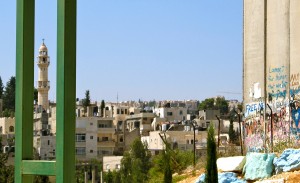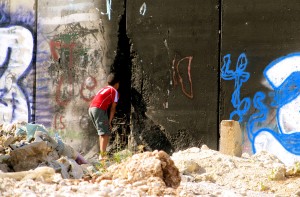Visiting Israel has always felt like coming home.
As a Jew, walking through the cobblestone streets in the Old City of Jerusalem brings forth a sense of enchantment. In Israel, I am not part of a minority, but rather surrounded by Jewish culture, familiar and safe.
For a long time, my starry-eyed view of Israel clouded me from critically examining its policies from different perspectives. That changed when I visited the Aida refugee camp.
Minutes away from Jerusalem, the air at this West Bank refugee camp was sticky and thick with the smell of the overflowing dumpsters nearby. The Israeli security barrier, colorful with protest murals, loomed over the camp, a constant reminder of life under occupation.

While I still felt that strong connection to Israel, this visit ridded me of the illusion that Israel was innocent of all the accusations piled against it.
I also realize that as a Jewish-American student, I can be a powerful constituent for peace and an end to occupation.
When embroiled in the campus conversation about – or more often the battle over – the Israeli-Palestinian conflict, students tend to forget or conveniently ignore the complex realities of life in that region.
The campus is still reeling from the biting and sometimes even hateful tone of last week’s Undergraduate Students Association Council meeting. After more than nine hours of public comment, the council voted down a resolution that would have called for the University of California to divest from five companies involved in Israel’s occupation of the West Bank and Gaza.
While I was against last week’s resolution, I was also incredibly disappointed by the majority of its vocal opposition. On the whole, the group arguing against divestment failed to fully acknowledge the illegality of Israel’s occupation and provide alternative means of fighting it. Instead, many denied or deflected pro-divestment students’ concerns altogether.
Jewish and pro-Israel students have influence in larger Israeli-American relations – indeed, many UCLA students attended this week’s American Israel Public Affairs Committee Policy Conference in Washington, D.C.
Because of their influence, they have a moral responsibility to actively protest Israel’s occupation of the Palestinian territories, but in a way that simultaneously affirms Jewish self-determination and Israeli security.
Granted, the threatening atmosphere perceived by the Jewish community is a great disincentive from joining the fight against occupation.
I was personally troubled by Students for Justice in Palestine’s ardent rationalization of incredibly offensive comments made by Omar Barghouti, a co-founder of the boycott, divestment and sanctions movement who spoke at UCLA in January. At his talk, he questioned Jewish peoplehood and right to self-determination, and made the claim that Jews were in every pillar of power in Nazi Germany.
In denying that Barghouti said anything out of line, Students for Justice in Palestine effectively shut down a potential conversation with the larger Jewish community about what is considered anti-Semitic.
The notion of divestment from Israel has deeply embedded and unsettling undertones for pro-Israel Jewish students, and understandably so – people tend to cover their ears and become defensive when the core of their identity feels attacked or misrepresented.
However, discomfort with harsh criticism of Israel does not excuse pro-Israel students from, at the very least, learning about the human rights violations to which it refers.
For example, if a group of pro-Israel and Jewish students brought forth a similar divestment bill, but one that condemned the boycott, divestment and sanctions movement and reaffirmed Jews’ right to self-determination, would we feel such a need to deny it? If we strip away the attacks on our identities and our rights, what is so wrong about divestment as a form of political protest?

Palestinians living in the West Bank face extensive impediments to movement, sporadic home demolitions and lengthy and invasive security checks. And while Israel often has legitimate reasons for these policies, many of them are much more arbitrary or oppressive than students might know or be willing to believe.
Opposing occupation is the most responsible, honest and moral way to ensure Israel’s security and continued existence – and doing so does not have to conflict with support for Jewish self-determination and the assurance of Israeli safety.
Just as we would vocally fight against injustices in the United States, so too should we commit to fighting those in Israel.
Israel is not the worst human rights aggressor in the world, and the larger world stage may disproportionately single it out. However, if Jewish students claim it holds a special place in our hearts and identities; if it is truly our homeland, we should not let any number of human rights violations within or surrounding its borders to go unaddressed.
So let’s make the anti-occupation movement on college campuses something we can stand behind. Let’s forge a new path – one of Jewish and Israeli pride and patriotism, and one of compromise, peace and justice.
Tweet Ferdman @MaiaFerdman. Send general comments to opinion@media.ucla.edu or tweet us @DBOpinion.

Agreed. Israel is NO saint. BUT, peace will come to Israel and Palestine when Palestinians love their own family more than they hate Jews.
It’s hard to love people in coffins and not hate the Jews who put them there. As a Jew, I can empathize with them.